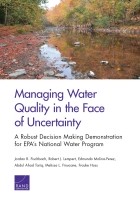| 来源类型 | Research Reports
|
| 规范类型 | 报告
|
| DOI | https://doi.org/10.7249/RR720
|
| ISBN | 9780833090669
|
| 来源ID | RR-720-EPA
|
| Managing Water Quality in the Face of Uncertainty: A Robust Decision Making Demonstration for EPA's National Water Program |
| Jordan R. Fischbach; Robert J. Lempert; Edmundo Molina-Perez; Abdul Ahad Tariq; Melissa L. Finucane; Frauke Hoss
|
| 发表日期 | 2015
|
| 出版年 | 2015
|
| 页码 | 162
|
| 语种 | 英语
|
| 结论 |
Climate Change and Other Uncertainties Could Have a Significant Impact on the Success of Water Quality Plans- In both pilot regions studied, total maximum daily load (TMDL) watershed implementation plans expected to meet water quality standards if future climate resembles the past do not meet these standards over a wide range of plausible future climate conditions.
- An increase in the amount of paved or impervious area cover due to future population growth, as well as worse-than-anticipated performance from stormwater best management practices (BMPs), could also lead to missing future standards.
Rainfall-Runoff Simulation Models Can Provide Useful Information for TMDL Planning Under Deep Uncertainty- Used within a Robust Decision Making (RDM) framework, these models can help decisionmakers explore the performance of TMDL plans across many plausible paths into the future.
Currently Available Simulation Models Are Suitable to Support RDM Analyses, but Much Could Be Done to Improve Their Utility- Treatment of BMP performance in the rainfall-runoff models could be improved, with better accounting for uncertainty related to BMP effectiveness.
- Models could be streamlined to better integrate with simulations of a more complete range of biophysical and socioeconomic processes and to facilitate scanning over many possible futures.
|
| 摘要 |
- To improve and maintain high water quality standards in changing, often difficult-to-predict conditions, USEPA and its partners will need to employ iterative risk management and rely increasingly on robust and flexible implementation plans.
- Future analysis could help make TMDL plans more robust by considering a wider range of potential uncertainties and a richer set of response options.
- The treatment of adaptive TMDL implementation plans could be considerably expanded.
- Improvements to the analytic tools used in this study could significantly improve the effectiveness of the decision support available to water quality planners. Packaging such tools in more user-friendly and potentially web-accessible toolkits could help make these methods widely available to decisionmakers at the local, state, and regional levels.
|
| 主题 | Environmental Pollution
; Global Climate Change
; Illinois
; Maryland
; Robust Decision Making
; Water Resources Management
|
| URL | https://www.rand.org/pubs/research_reports/RR720.html
|
| 来源智库 | RAND Corporation (United States)
|
| 引用统计 |
|
| 资源类型 | 智库出版物
|
| 条目标识符 | http://119.78.100.153/handle/2XGU8XDN/108148
|
推荐引用方式
GB/T 7714 |
Jordan R. Fischbach,Robert J. Lempert,Edmundo Molina-Perez,et al. Managing Water Quality in the Face of Uncertainty: A Robust Decision Making Demonstration for EPA's National Water Program. 2015.
|
|
文件名:
|
x1526319953328.jpg
|
|
格式:
|
JPEG
|

|
文件名:
|
RAND_RR720.pdf
|
|
格式:
|
Adobe PDF
|
除非特别说明,本系统中所有内容都受版权保护,并保留所有权利。